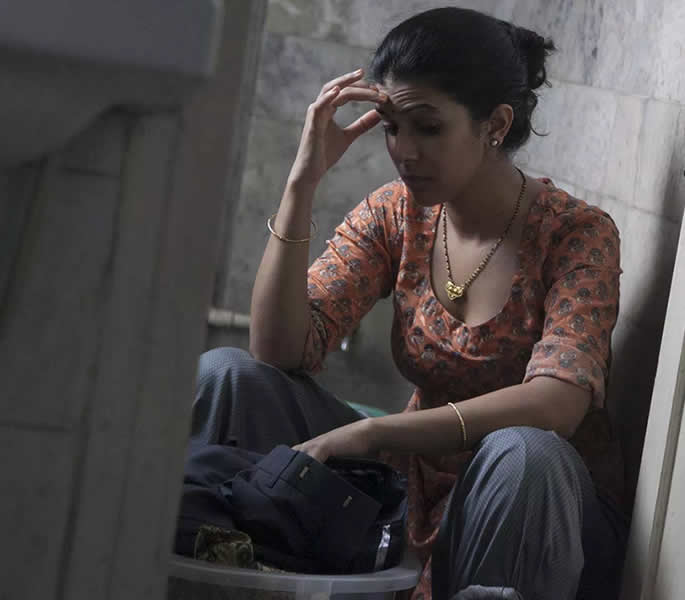"My husband was a coward and didn't stand up for me."
British Asian divorce is increasingly becoming the norm throughout all South Asian communities. However, is divorce still something that most people frown upon or cannot talk about?
It is a well-known fact that couples have been getting married and divorced from time immemorial. The belief that each person should have the freedom to end an unhappy relationship has long been accepted by Western societies.
Talking to some South Asian women about British Asian divorce paints a very different picture and, according to them, divorce or separation is still regarded as unacceptable and improper.
Single British Asian women trying to survive in the harsh conditions created by those closest to them will struggle to live a trouble-free life.
The typical lament of ‘what will we tell our friends and relatives’ will inevitably come from the parents. These are the very people who should offer the much-needed love and support at such a crucial time.
Here, five women share their own personal accounts of the problems they faced and how they coped with the stigma still attached to being a British Asian divorcee.
Nina
Nina is a British Punjabi who told us that it was the physical and mental abuse which forced her to divorce.
Her in-laws were controlling and dictated where she went and what she wore. They also kept tabs on who she spoke to in the Asian community.
She says: “I didn’t receive any support from my ex-husband, not even financially when my son was born. I was treated like a slave and was never acknowledged.”
Her own family struggled to accept the news about her divorce as she hadn’t kept them in the loop about her problems during her marriage.
“Gradually I started to open up when I returned home. I told my family that my final decision was to leave him. I was diagnosed with post-natal depression and my son was only four months when I left.”
Although her parents were on her side, she knew that her decision to walk out of her marital home had bought shame and dishonour onto her family.
Other people in the Asian community, especially women, had plenty to say. They even told her to go back for the sake of her son.
At no point was the state of her own condition and mental health taken into account or considered by anyone outside the immediate family.
She believes that it opened her eyes to what people are really like and who can trust and rely on in times of need.
She lost confidence in the Asian community as a whole and is adamant in her belief that British Asian divorce is still unthinkable for many.
“My in-laws would try and get in touch with my own family and start making up stories trying to blame me for the split. It was all lies.”
“I lost my job and had to start all over again in another city. Finding a place to live so difficult as a single Asian parent.”
Nina told how she had to attend court for nine months before any legal aid was approved. This plunged her further into financial difficulties.
“The hardest part was having to find myself again. I wasn’t afraid to face the community anymore. I hadn’t done anything wrong.”
“To my mind, it was the best decision I could have made for myself and my son but regaining my confidence was hard.”
She explains that: “talking about it was difficult. It was having an emotional impact on me. Women always get the blame. Divorce has changed me as I am definitely a lot stronger and far more confident.”
“I don’t care what others think anymore. I’m much happier dealing with it in my own way.”
She made the choice to not keep in contact with any of her husband’s side of the family even those that had shown some empathy towards her.”
“It was the right thing to do. I need to move on. I want to be free to live my life the way I want from now on.”
Anecdotal evidence indicates divorce rates are rising among the UK’s Asian population, leading to a growing group of one-parent families who find themselves ostracised from the community.
Ayesha
British born Ayesha was left in India as a child by her parents to finish her education and returned to England with no UK recognised qualifications.
I was twelve and jaundiced. The medications had left me unconscious and drugged. All I remember is seeing Mum walking away and waving goodbye.”
Eventually, at the age of nineteen, she came home but by that time she had lost touch with British culture and had developed a strong Indian accent.
She found it difficult to fit in. Two years later she was confined to a further life of misery as a docile and tormented Indian wife.
“I was married into a large and very wealthy family of five brothers who all had wives and children so I was the youngest. They treated me like a slave.”
Ayesha recalls her horror at being made to clean the kitchen windows when she was fully pregnant.
“My husband was a coward and didn’t stand up for me. The women in the house were so nasty.
“It got worse. He would come home drunk every night after going to nightclubs. He would swear at me and call me a bitch. I didn’t tell my parents. I was afraid they would blame me too.”
However, the abuse continued until one day she was pushed down the stairs while she was pregnant for the second time.
“I knew I couldn’t carry on like this anymore. But I was so frightened of those horrible women and what they might do to me and my children.”
It was when she discovered that her husband was having an affair that she finally plucked up the courage to leave.
“I told my dad everything. He told me not to worry and came and picked us up. I finally left that hell-hole.”
Once again, Ayesha started to pick up the pieces of her life. She faced many challenges and negative vibes from those around her.
British Asian divorce figures might be increasing as a whole but the negativity continues to cast a shadow over the South Asian community in the UK.
Ayesha moved into rented accommodation but the questions on everyone’s lips were always: “what does your husband do?”, “where is your husband?” and “why doesn’t your husband live with you?”
The snide comments only came from the Asian women. She felt judged and found it incredibly difficult bringing up her three sons as a British Asian divorcee in a community which was predominantly South Asian.
“Their beady little eyes watched me all the time. I hated them.”
“Why couldn’t they just leave me alone? Hadn’t I been through enough already?”
Ayesha bravely fought against all opposition and said she went on to study and qualify as a college tutor. She said divorce had definitely changed her “because I found it hard to trust men again.”
“But I’m lucky, I found love again. I’m happily married now. He’s white but what’s frustrating is that my parents hide this fact from everyone.”
Dipi
Dipi is a British Indian lady who talks bitterly about her husband and the way he turned their marriage into a sham.
“The reason I divorced my ex was because he was having an affair.”
Dipi was angry that he made no effort to hide this and would flirt and act shamelessly in front of her.
“He was always on his phone and used to keep it with him all the time.
“My suspicion got the better of me and I opened one of his bills when it arrived. I was shocked to see the number of times he was texting and calling that woman.
“When I confronted him he denied anything was going on – he said that she called him for advice about her own relationship with her husband. What was he – a marriage counsellor or something?”
Dipi was dumbfounded to think that they didn’t see that their flirting, touching, dancing intimately and sharing a dinner plate was wrong.
“I then showed them the messages they had sent each other. They still denied it even though it was staring them in the face.”
Dipi was at her wit’s end by now and wanted out of this absurd situation.
She decided to call it a day and sent him the divorce papers. He begged her not to go through with it but she was adamant.
The divorce, according to Dipi, gave her independence and the strength to make her own decisions. Her son still blamed her for the divorce as it meant he couldn’t see his dad as much anymore.
It still saddens her how it had a damaging effect on the mother-son relationship and that he has never quite fully forgiven her.
Her own mother and her mother-in-law were both very much against the idea of them divorcing and made no attempts to hide this fact.
“His mum didn’t want our home to break. My mum felt ashamed that her daughter was getting divorced and she also blamed me for letting that woman into our lives.
“She also told me not to tell any of our relatives and friends. I told her I hadn’t done anything wrong so why should I be ashamed.”
For Dipi, the problem had only just begun. She struggled to manage financially and almost lost the very house she had made her home.
The mortgage and the bills were piling up. Re-mortgaging the property enabled her to gain some control and stability.
She believes it would always be the women who get blamed and never the men.
“British Asian divorce will always attract attention and it’s never good attention.”
The betrayal was the hardest thing to deal with. As she says:
“It’s heartbreaking when someone breaks that trust and makes you feel worthless.
“The trust in men just disappeared and I am still single but a lot more independent and confident. No man is worth it and I will not be treated like a doormat ever again.”
The emphasis put on the values of marriage and family in Britain’s Asian communities is still strong, and there is still a stigma attached to divorce and separation.
Raji
British born Raji tells her story of how mental health stigmatised her life and marriage.
“I divorced because I lost myself to depression and stopped living my life my way.
“The debt was pulling me under and I was constantly under pressure. The mental abuse was not visible as there was no physical abuse.”
Her turning point was when she finally made the decision to see her doctor about the way she felt mentally.
“I had got to a point where I wanted my life to end and the nightmare to stop.
“He diagnosed me with depression but said that as a young mum of two didn’t want me to be on medication.
“I was constantly trying to show the world outside I was happy when inside I was slowly dying.”
Raji then took the step to seek further help and accessed therapy services.
“My first step was to see a counsellor. As an Asian, it’s not something that’s promoted or talked about but mental health is real.
“Everything I talked about led back to my ex-husband.
“His lies, distrust and that he never saw me as me but just expected me to provide, cook and clean.
“He was the typical Asian man from India and seldom worked. I had no other option but to leave him.”
Eventually, Raji’s parents came to her house. Not to ask her how she was feeling and wanted but to tell her not to divorce.
“According to them, Asian women didn’t get divorced. They were angry and claimed I would bring shame to the family.
“They didn’t support me and lost touch with me and I don’t see them anymore.
“There was no family support and I had to adjust to being a young, single, Asian mum with two small boys and a full-time job.”
Raji’s boys were made to understand everything about the divorce and why their dad was not living with them anymore.
Not seeing her parents did upset her at first but now it doesn’t bother as much. She feels “it’s their loss”.
Talking about the impact of the divorce on her, she says:
“Divorce has definitely changed me as a person. I have become me again.”
“I have learned to stop thinking about the past and blaming myself for marrying someone who used me rather than loved and supported me.
“Everything I have achieved I am proud of, especially my children. We now have a happy home and a happy life; it’s simple and it’s on my terms.”
Her way of dealing with the community and those who have opinions about her life and the way she lives it is not to pay attention to them.
“The best way to survive is to ignore those that make snide comments and I have cut ties with anyone that brings negativity into my life.
“I feel stronger and liberated as a person again. I may have the tag of British Asian divorcee with children, but I smile and think yes I am and I am proud.
Raji knows the divorce took a lot out of her and was a huge shift in life but knows it was the right thing for her and her boys in the long term.
“Others don’t have enough courage to go for a divorce; mostly Asians who don’t want to disappoint their families or society.
“Everything happens for a reason. I just take one step at a time and count my blessings.”
Inderjit
Inderjit is a Punjabi British Asian who has been bought up in the UK. She recalls how incredibly difficult it was to find the courage to leave her husband.
“It was obvious I had to leave. There had been no laughter for so long but I was scared. Scared of being on my own even though being with him was worse.
“My husband was not abusive. He was just never sober.
“I had no support with my three children and had to bring them up on my own. He made our lives a misery.
“Once, when I’d had enough, I took an overdose.
“My youngest son was at home and he was only ten. I had passed out on the sofa. He was terrified and he called my sister who came and called an ambulance.”
She recalls how her two oldest sons turned to drugs.
“I was too busy keeping tabs on their dad to notice what was happening to them. I feel so guilty now.”
Inderjit finally reached the momentous decision to leave her husband. She was lucky to have the support of her family. Naturally, some people were all too ready to shift the blame making her responsible for the split.
“His family didn’t care. They didn’t want to take on the job of looking after an alcoholic.
“They said I must have been doing something to make him drink so much. It was my fault of course, not his.”
In the end, Inderjit put him on a plane to India where his family could shoulder the responsibility of caring for her alcohol dependent husband.
She divorced him but this led to more backlash from ‘other people’.
“People looked at me as if I had committed a crime. His relatives shunned me completely and I lost touch with all of them.
“They all knew what I had been through but said I should have still stayed with him.”
Even though her parents supported her decision to divorce they found it difficult to share this information with those ‘other Asian people’ in their lives.
“I don’t regret my decision to divorce though it meant I lost touch with many people who I thought were my closest friends.”
“Even those from my husband’s side of the family who had accepted my help when it suited them wanted nothing to do with me.”
Inderjit told us the divorce made her stronger, happier and more confident. As she states:
“I finally believed in myself again and could live my life without looking over my shoulder.”
Each of these stories have a similar theme running through them. Most people in Asian societies are still stuck in their traditional ways. They cannot accept that British Asian divorce is not a problem but a solution to an unhappy relationship.
Culture plays a big part in this and what stops parents from supporting their daughters through the difficult time is the shame and the fear of rejection from the community.
However, it is promising that not all parents are of this mindset. Some are embracing the changes as they immerse themselves into British society and accept the changes.
Another positive was that these women were all much happier in themselves. The divorce had made them stronger and more determined. They found the independence and confidence that had been lacking in their relationships.
Nonetheless, one question still remains. Will the stigma attached to British Asian divorce ever be a thing of the past or will the women continue to shoulder the blame and shame?

































































